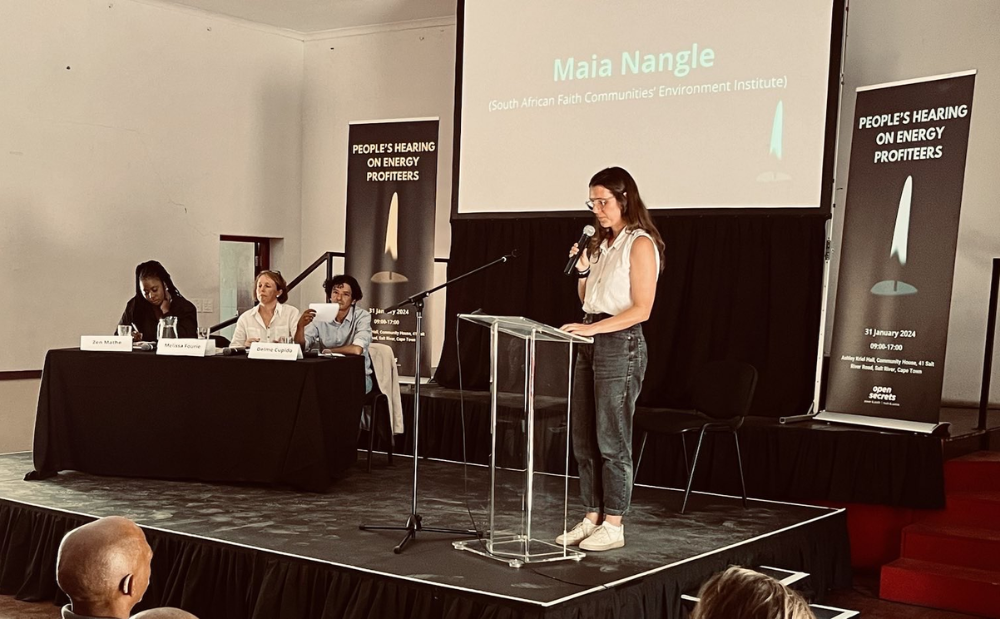SAFCEI attends the People’s Hearing on Energy Profiteers
- Published:

On 31 January 2024, SAFCEI’s executive director, Francesca de Gasparis, and campaigns coordinator, Maia Nangle, joined the Open Secrets’ People’s Hearing on Energy Profiteers—a platform advocating for the prioritization of rights in addressing the energy and climate crises. The hearing showcased testimonials from various South African organizations, shedding light on the impacts of energy profiteering, the role of the energy sector in climate issues, and community resistance against energy profiteers. A panel of judges listened to these testimonials, emphasizing pain, damage, hope, and solidarity.
SAFCEI’s testimonies underscored the fact that energy sector governance affects people of faith in all walks of life who are made vulnerable by unaffordable, inaccessible and unsafe energy.
SAFCEI has long focussed on nuclear energy procurement as a vehicle for corruption. In the context of a just energy transition, energy choices by government can mean greater climate impacts, and fewer options for development pathways or realisation of rights. February 2006 was when Eskom first announced "load shedding" in the Western Cape province, due to issues experienced by Koeberg Nuclear Power Plant, illustrating that nuclear energy is not the reliable source that people expect it to be.
In 2017, SAFCEI and Earthlife Africa won a court case opposing a corrupt and unconstitutional 1 trillion nuclear deal. South Africa now plans to extend the life of the Koeberg nuclear power station for another 20 years with safety issues that have not been addressed. South Africa has also advertised plans for new 2500 MW nuclear power plants.
South Africa has not managed its existing energy fleet. We experience load shedding daily and yet are expected to believe we can afford expensive, unnecessary, dangerous new nuclear energy. In the UK, the new nuclear power plant, Hinkley C, is taking decades longer than expected and its costs (before completion) have doubled the original estimate. Choosing to invest in nuclear energy means less money for more affordable energy options like solar, which in turn means electricity will be less accessible or affordable for the many.
In 2020, SAFCEI conducted research on energy affordability of 100 people, assessing the impact of the electricity price hike on poor urban and peri-urban communities in Cape Town. Research included 40 people in Khayelitsha, 40 people in Mitchell’s plain and 20 people in Klapmuts. People spoke of the difficult choices between toiletries and electricity, travel to work and electricity, food and electricity. From the 2008 electricity crisis onwards, there is a clear and sharp inflection point for electricity tariffs in South Africa. From 2007 to 2022, electricity tariffs increased by 653%, whilst inflation over this period was 129%. Thus, electricity tariffs increased four-fold in real money terms in 14 years. On 31 January 2024, government announced another 12.74% increase for electricity (after 18.65% last year).
The testimonies also focused on lived experiences of communities in South Africa. In the Northern Cape, Vaalputs is the national radioactive waste disposal site. Surrounding communities have been actively excluded from the decision-making process. Vaalputs was established in 1983, and local communities were only contacted by the National Nuclear Regulator in 2003. This lack of consultation continues until today. The Public Safety Information Forum meetings have limited the number of community members that can attend, and a site that houses radioactive waste that experienced leakages in 1997, is surrounded by an air of secrecy.
Communities in KZN experience environmental degradation and health impacts of the mines, lack of rehabilitation and accountability. There are no long term economic benefits but rather short term gains in low paid and dangerous work. The cycle of poverty is reinforced as energy profiteers prey on desperate communities. There is division in communities, and those who oppose mining are often portrayed as anti-development, without asking who actually benefits.
In the extremely water-stressed Karoo, South Africa is undertaking water-intensive fracking, resulting in groundwater contamination, further impacting access to water. Additionally, in the Integrated Development Plan (IDP) for Merweville, uranium mining is identified as an area for development. The community of Graaff Reinet is disillusioned with the Just Energy Transition, as the development of a wind farm has seen no benefits or community involvement in decision-making. It is important that the language of the Just Transition is not co-opted by corporations and profiteers. In Noupoort, community land was handed over to the municipality and intended for use in community activities, but has now been allocated for privately owned wind and solar, with no benefit to the local communities.
The testimony underscores the importance of a comprehensive approach to address the climate crisis, with active community participation and prioritizing people over profit.
By Maia Nangle
Who we are

SAFCEI (Southern African Faith Communities’ Environment Institute) is a multi-faith organisation committed to supporting faith leaders and their communities in Southern Africa to increase awareness, understanding and action on eco-justice, sustainable living and climate change.
Featured Articles
-

South Africa: Who Ends Up Paying If DMRE Cooks the Price of Nuclear Power?
-

South Africa’s nuclear energy expansion plans continue to draw criticism, environmental NGOs chew over legal challenge
-

Earthlife Africa and SAFCEI respond to latest unsettling nuclear news regarding the ministerial determination
-

Open Wing Alliance Africa (Virtual) Summit 2023
-

The Green Connection and SAFCEI respond to energy minister's divisive and deflecting comments
-

Job Vacancy: FLEAT Coordinator







